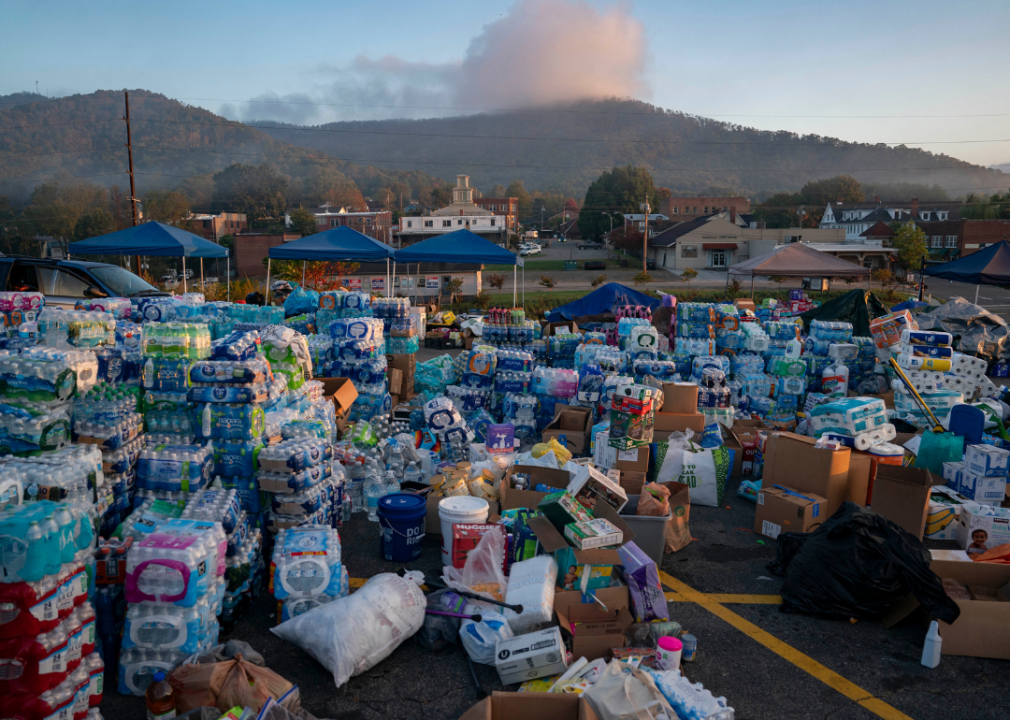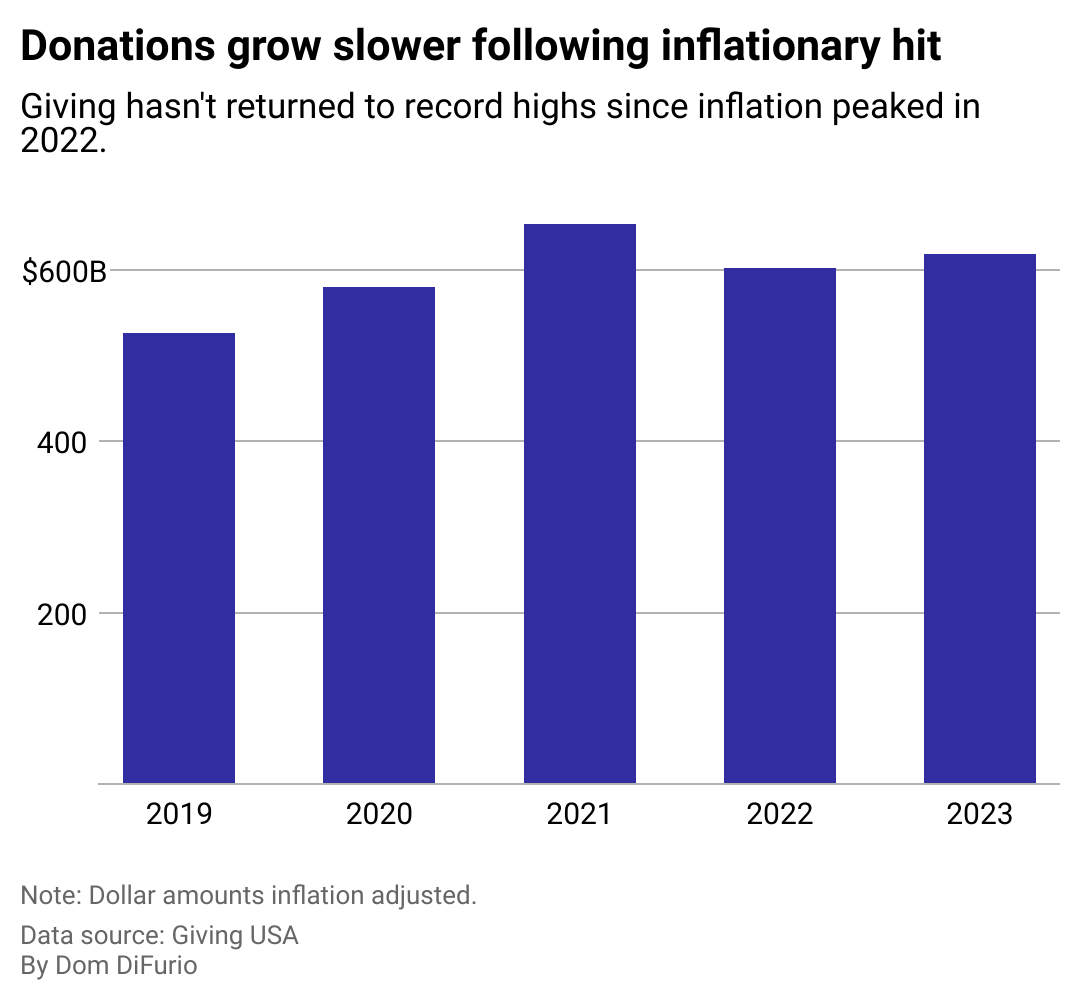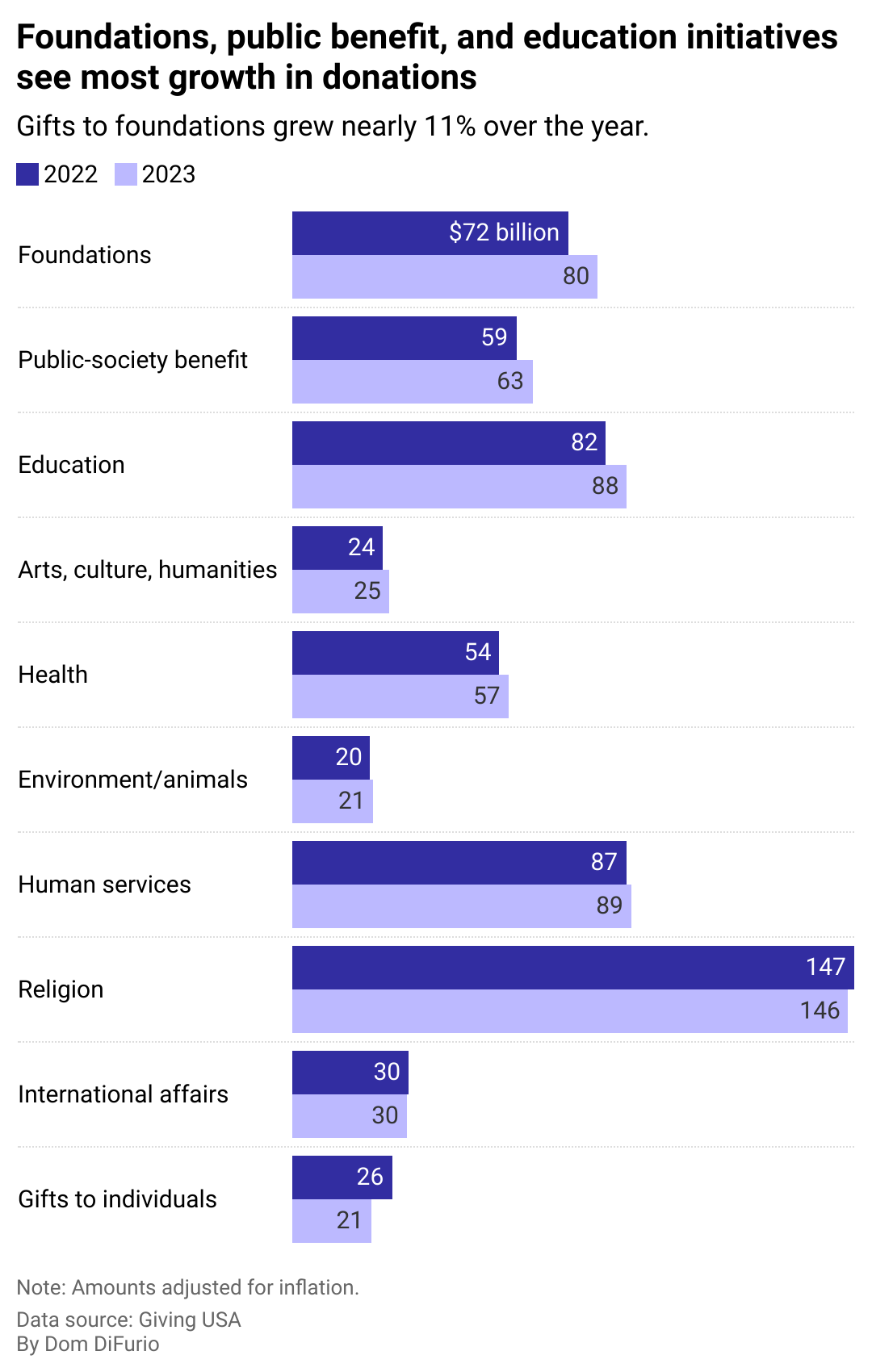Charities look to make up for weak revenue, shifting donor base this GivingTuesday

ALLISON JOYCE/AFP // Getty Images
Charities look to make up for weak revenue, shifting donor base this GivingTuesday
Stacks of donated water and supplies after Hurricane Helene.
Inflation has strained consumers’ finances in recent years. It is also having an impact on the charities that depend on donations to do their mission-driven work.
Even as charities feel the economic squeeze, however, those in the grant-giving, civil rights, social causes, and educational sectors have seen substantial growth in donations over the last year.
Windfall analyzed Giving USA data, a collaborative study between Bank of America and Indiana University, as well as its own proprietary data on nonprofits, to illustrate how charitable giving is shifting ahead of this year’s GivingTuesday.
GivingTuesday has been a key fundraising opportunity for charities around the country to harness the gratitude and goodwill of a broad swath of donors during the holiday season. In 2023, donations increased just 0.6% from the year before, after adjusting for inflation―a miniscule change after a historically hot inflationary period and a declining number of big donors.
A 2023 study by the Indiana University Lilly Family School of Philanthropy and Bank of America found that 8 in 10 affluent individuals gave charitably. Respondents, whose average income and net worth were approximately $524,000 and $31.0 million, respectively, gave about 17.5 times more to charity than the general population during the 2022 calendar year.
Similarly, an analysis from Windfall―a wealth intelligence and AI company―of more than 1,000 nonprofit organizations, showed that households with the highest net worths give at higher rates, making them a critical piece of the nonprofit economy. Older generations tended to give at higher rates than millennials, according to Windfall’s analysis, with baby boomers and donors over age 78 drawing from wealth likely accumulated over a lifetime.
In recent years, however, more donations are coming from fewer people as the average age of donors who give their first large gift has increased to 66 years of age, according to Joshua Meyer, vice president of Market Engagement at Bloomerang, writing for Giving USA.
The shifting demographics of who gives could portend a changing philanthropic landscape. As nonprofits hope sluggish revenue growth, dragged down by inflation, is behind them, they are hopefully looking to double down on growth through large donations in the coming years.
![]()

Windfall
Charities’ purchasing power fades with the value of the dollar
A column chart showing how much money was donated to nonprofits from 2019-2023. When adjusted for inflation, overall giving has fallen each year since notching a record high in 2021. In 2023, $557.2 billion was given to charities.
Adjusted for inflation, overall donations to charities fell in 2022 after peaking in 2021, and grew slightly in 2023, according to Giving USA’s Annual Report on Philanthropy.
Inflation began to rise in 2021 and peaked in 2022, diminishing the power of each dollar spent and received by American businesses and consumers. The annual rate of change in overall costs of goods and services began to cool back down to historically normal levels only in the latter half of 2024.
The impact of inflation on charitable organizations has been twofold, discouraging donations from individuals, who feel they need to conserve cash amid higher costs, as well as diluting the net impact of donations.
That trend could be continuing into this year, according to estimates by the GivingPulse Q2 2024 Report published by GivingTuesday, an organization that supports the philanthropic movement. Its data shows that nonprofits will likely recover lost ground this year after seeing declining donations.

Windfall
Wealthy donors are aging, but their preferences still shape giving patterns
A grouped bar chart showing how much Americans donated to different types of charities in 2022 and 2023 in billions of dollars. The largest growth in donations was in Foundations, Public society benefit organizations, and educational nonprofits.
Giving USA has estimated that the biggest growth in 2023 donations came from “bequests,” which occur when someone leaves a charitable gift outlined in their will. Foundations, public society benefit organizations, and educational charities benefited the most from this growth in donations.
Among the high-net worth and ultra high-net worth households surveyed by Windfall, donations to educational causes steadily increased since 1995. The analysis also revealed a sharp increase in donations from wealthy donors to human services over the past decade. This broad category of charitable causes includes child welfare, poverty, mental health, and substance abuse treatment, though the survey did not differentiate donation amounts to issues.
Younger generations of Americans, who will become the next major donor class, are more likely to view philanthropy as an opportunity to donate their time and less likely as a vehicle to donate money or assets, according to researchers at Indiana University, particularly when compared to older generations driving current philanthropic trends.
Younger generations may also reshape the types of organizations that receive the bulk of charitable donations, by prioritizing issues like the environment and racial justice. They are less likely to donate to religious organizations, which as a sector, regularly draws in the largest sums of donation, even as overall donations fell in 2023.
The 2024 holiday season, however, could spell a welcome boon for charities.
Nonprofit marketing consulting firm Whole Whale projected that GivingTuesday, falling on Dec. 3, 2024, will net 11% more donations compared to last year. However, the organization acknowledged the difficulty in forecasting giving in the wake of a hotly contested election. As market growth accelerates and inflation slows down, doubled with a stable employment rate and increased consumer spending, donations may very well swell this season.
It would certainly be a relief for charities experiencing higher demand for their services and higher operating costs. With so many Americans struggling, those in a position to give back may feel moved by the spirit of the season.
Story editing by Alizah Salario. Additional editing by Kelly Glass. Copy editing by Sofia Jarrin.
This story originally appeared on Windfall and was produced and distributed in partnership with Stacker Studio.
